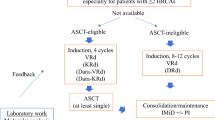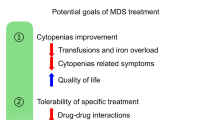Abstract
Purpose
Myelodysplastic syndromes (MDSs) refractory or relapsed after hypomethylating agents (HMAs) remain a therapeutic challenge. The CHG regimen has been demonstrated to be effective in initially treating higher risk MDS. The current study evaluated the efficacy and toxicity of the CHG regimen in patients who were resistant to decitabine.
Methods
Patients with higher risk MDS relapsed or refractory to decitabine were enrolled in this study. Each patient received the CHG regimen (cytarabine (25 mg/day, days 1–14) and homoharringtonine (1 mg/day, days 1–14) intravenously with G-CSF (300 μg/day) subcutaneously from day 0 until neutrophil count recovery to 2.0 × 109 cells/L). Next gene sequencing with a 31-gene panel was carried out in patients.
Results
Thirty-three patients were enrolled, including 12 relapsed and 21 refractory cases. The overall response rate (ORR) was 39.4% (13 of 33), with 9 (27.3%) achieving complete remission (CR), 2 having marrow CR (mCR), and 2 achieving partial remission (PR). The CR rate was higher in patients harboring fewer gene mutations (0–1) (55.6%) than in those with more gene mutations (> 1) (12.5%) (p = 0.021). The median overall survival (OS) of the 33 patients was 7.0 months. Patients who achieved a response had significantly longer survival times than were found in those without a response (21.0 M vs. 4.0 M, p < 0.0001). The regimen was endurable for most of the patients.
Conclusions
The CHG priming regimen provided a safe and effective salvage regimen for higher risk MDS patients who were resistant to decitabine. Further studies involving larger samples will be needed. Clinical trial No. ChiCTR-ONC-11001501.


Similar content being viewed by others
References
Bejar R, Steensma DP (2014) Recent developments in myelodysplastic syndromes. Blood 124:2793–2803
Bennett JM, Catovsky D, Daniel MT (1976) Proposals for the classification of the acute leukaemias: French-American-British Cooperative Group. Br J Haematol 33:451–458
Brunning R, Orazi A, Germing U et al (2008) Myelodysplastic syndromes. In: Swerdlow SH, Campo E, Harris NL et al (eds) WHO Classification of Tumours of Haematopoietic and Lymphoid Tissues, 4th edn. IARC Press, Lyon, pp 87–104
Cheson BD, Greenberg PL, Bennett JM et al (2006) Clinical application and proposal for modification of the International Working Group (IWG) response criteria in myelodysplasia. Blood 108:419–425
Craddock C, Quek L, Goardon N et al (2013) Azacitidine fails to eradicate leukemic stem/progenitor cell populations in patients with acute myeloid leukemia and myelodysplasia. Leukemia 27:1028–1036
Feldman E, Arlin Z, Ahmed T et al (1992) Homoharringtonine in combination with cytarabine for patients with acute myelogenous leukemia. Leukemia 6:1189–1191
Fenaux P, Mufti GJ, Hellstrom-Lindberg E et al (2009) Efficacy of azacitidine compared with that of conventional care regimens in the treatment of higher-risk myelodysplastic syndromes: a randomised, open-label, phase III study. Lancet Oncol. 10:223–232
Germing U, Hildebrandt B, Pfeilstöcker M et al (2005) Refinement of the international prognostic scoring system (IPSS) by including LDH as an additional prognostic variable to improve risk assessment in patients with primary myelodysplastic syndromes (MDS). Leukemia 19:2223–2231
Greenberg P, Cox C, LeBeau MM et al (1997) International scoring system for evaluating prognosis in myelodysplastic syndromes. Blood 89:2079–2088
Greenberg PL, Tuechler H, Schanz J et al (2012) Revised international prognostic scoring system (IPSS-R) for myelodysplastic syndromes. Blood 120:2454–2465
Issa JP, Kantarjian HM (2009) Targeting DNA methylation. Clin Cancer Res 15:3938–3946
Jie H, Donghua H, Xingkui X et al (2007) Homoharringtonine-induced apoptosis of MDS cell line MUTZ-1 cells is mediated by the endoplasmic reticulum stress pathway. Leuk Lymphoma 48:964–977
Kantarjian H, Issa JP, Rosenfeld CS et al (2006) Decitabine improves patient outcomes in myelodysplastic syndromes: results of a phase III randomized study. Cancer 106:1794–1803
Li X, Chang C, He Q et al (2013) Cytogenetic response based on revised IPSS cytogenetic risk stratification and minimal residual disease monitoring by FISH in MDS patients treated with low-dose decitabine. Leuk Res 37:1516–1521
Saito K, Nakamura Y, Aoyagi M et al (2000) Low-dose cytarabine and aclarubicin in combination with granulocyte colony-stimulating factor (CAG regimen) for previously treated patients with relapsed or primary resistant acute myelogenous leukemia (AML) and previously untreated elderly patients with AML, secondary AML, and refractory anemia with excess blasts in transformation. Int J Hematol 71:238–244
Santini V (2012) Novel therapeutic strategies: hypomethylating agents and beyond. Hematology Am Soc Hematol Educ Program. 2012:65–73
Santini V (2019) How I treat MDS after hypomethylating agent failure. Blood 133:521–529
Tefferi A, Vardiman JW (2009) Myelodysplastic syndromes. N Engl J Med 361:1872–1885
Trotti A, Colevas AD, Setser A et al (2003) CTCAE v3.0: development of a comprehensive grading system for the adverse effects of cancer treatment. Semin Radiat Oncol 13:176–181
Wu L, Li X, Su J et al (2009) Effect of low-dose cytarabine, homoharringtonine and granulocyte colony-stimulating factor priming regimen on patients with advanced myelodysplastic syndrome or acute myeloid leukemia transformed from myelodysplastic syndrome. Leukemia Lymphoma 50:1461–1467
Wu L, Li X, Su J et al (2011) Efficacy and safety of CHG regimen (low-dose cytarabine, homoharringtonine with G-CSF priming) as induction chemotherapy for elderly patients with high-risk MDS or AML transformed from MDS. J Cancer Res Clin Oncol 137:1563–1569
Wu L, Li X, Chang C et al (2016) Efficacy and toxicity of decitabine versus CHG regimen (low-dose cytarabine, homoharringtonine and granulocyte colony-stimulating factor) in patients with higher risk myelodysplastic syndrome: a retrospective study. Leuk Lymphoma 57:1367–1374
Xie M, Jiang Q, Li L et al (2016) HAG (Homoharringtonine, Cytarabine, G-CSF) regimen for the treatment of acute myeloid leukemia and myelodysplastic syndrome: a meta-analysis with 2314 participants. PLoS One 11:e0164238
Xu F, Wu LY, Chang CK et al (2015) Whole-exome and targeted sequencing identify ROBO1 and ROBO2 mutations as progression-related drivers in myelodysplastic syndromes. Nat Commun 6:8806
Yamada K, Furusawa S, Saito K et al (1995) Concurrent use of granulocyte colony stimulating factor with low-dose cytosine arabinoside and aclarubicin for previously treated acute myelogenous leukemia: a pilot study. Leukemia 9:10–14
Zhou JY, Chen DL, Shen ZS, Koeffler HP (1990) Effect of homoharringtonine on proliferation and differentiation of human leukemic cells in vitro. Cancer Res 50:2031–2035
Funding
This work was supported by the National Science Foundation of China (81670121).
Author information
Authors and Affiliations
Corresponding authors
Ethics declarations
Conflict of interest
Lingyun Wu has received research grants from National Science Foundation of China and declares that she has no conflict of interest. Cai Xiu, Xiao Li, Feng Xu, Qi He, Zheng Zhang, Dong Wu, Luxi Song, Jiying Su, Liyu Zhou, Youshan Zhao, Ying Tao, and Chunkang Chang declare that they have no conflict of interest.
Ethical approval
All procedures performed in studies involving human participants were in accordance with the ethical standards of the institutional and/or national research committee and with the 1964 Helsinki declaration and its later amendments or comparable ethical standards.
Informed consent
Informed written consent was obtained from all individual participants included in the study.
Additional information
Publisher's Note
Springer Nature remains neutral with regard to jurisdictional claims in published maps and institutional affiliations.
Rights and permissions
About this article
Cite this article
Xiu, C., Li, X., Wu, L. et al. The efficacy and toxicity of the CHG priming regimen (low-dose cytarabine, homoharringtonine, and G-CSF) in higher risk MDS patients relapsed or refractory to decitabine. J Cancer Res Clin Oncol 145, 3089–3097 (2019). https://doi.org/10.1007/s00432-019-03031-w
Received:
Accepted:
Published:
Issue Date:
DOI: https://doi.org/10.1007/s00432-019-03031-w




